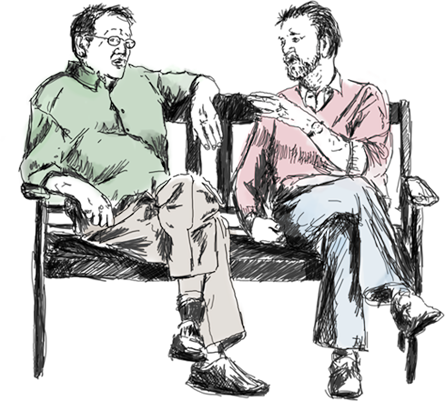Ef Zin
Realize Meaning In Your Experience Of Living
Actualize Your Potential To A Meaningful Life
Many of us perceive quality in terms of material value. As a consequence, quality of life is defined through the objects we own instead of the quality of our experiences, the number of friends we have instead of the quality of our friendships, the number of activities in which we participate instead of the quality of our actions, and the money we make instead of the value we create in its making.
Ef Zin is the work of Classical Thinkers, notably Aristotle. It reflects a view on life not merely as what it is but as what it can be if we actively participate in its making. It represents a wholistic and all-inclusive antidote to the material aspects of contemporary living, providing answers on “How to become what we have the potential of becoming by discovering ourselves” rather than “What to be or do to achieve fulfillment”.
Quality comes from quality and may be represented in tangible things, but quality is not tangible in nature. Understanding quality involves exploring meaning, and this, in turn, requires that we learn to evaluate things for what they really are, not just what they appear to be. A life of value is one where we act as agents in creating meaning for ourselves by defining the symbols we use to represent us instead of using them to define ourselves.
"Life in the true sense is perceiving or thinking." Aristotle
This is why, within Ef Zin, the instrument of our well-being can be no other than the quality of our character, as that is reflected in the quality of our thinking. Our thinking is the foundation upon which our decisions are made, our experiences are formed, and our personal wisdom is developed. Wise thinking involves exploring meaning, evaluating choices, examining actions taken in attaining goals and reflecting on the ideas we form as conclusions of the evaluations we make. We become the agents of the lives we create as we develop a strong sense of self that can determine both purpose and meaning.
- Develop Your Potential As Humans
- Develop Personal Value
- Develop the Value of Your Experiences
- Develop Wise Thinking
Develop Your Potential As Humans
To Create Value For Yourselves and Others
The need for self-worth is part of human nature. We yearn for our lives to matter, and we make every effort to ensure that our feelings, work, beliefs, and ideas are of value. We go to great lengths to distinguish ourselves by presenting the perfect image, pursuing an excellent job, forming the ideal love relationship or creating the perfect family. We socialize, keep busy and put on a happy face. However, in our quest for happiness, we often confuse the appearance of joy with true contentment and mistake fleeting pleasure for enduring fulfillment. Only when we are genuine do we become truly unique and attain self-worth when we cultivate value for ourselves and others.
We are not perfect. There is a paradox in our nature that often goes unnoticed. We become stronger by becoming aware of our limitations, confident by recognizing our fears and insecurities and truthful by understanding the nature of our self-deceptions. Unfortunately, many overlook the value of this paradox. They look for ways to escape it, ways to mask it, and ways to ignore it by dismissing the negative qualities of themselves. If we overlook the paradox ingrained in our lives, we risk losing out on its inherent benefits. The paradox allows us to venture down multiple paths, exploring and experimenting until we discover what brings us genuine satisfaction and meaning. It grants us the freedom to craft our won identity and purpose and to pursue what we deem personally valuable.
“Each human being is bred with a unique set of potentials that yearn to be fulfilled as surely as the acorn yearns to become the oak within it.” Aristotle
Within Ef Zin, this very paradox of human nature holds the energy to propel us forward. But we need to learn how to release this energy and give it a unique identity (morphi, “μορφή”). We need to realize the nature of both the positive and negative aspects of our personality and understand how they aid or hinder our growth. Realizing how they can work together in measure (metro, “μέτρο”) we can develop a true sense of self and actualize our true potential.
Well-being is the result of personal effort and not luck or circumstance. True happiness (eudaimonia, “ευδαιμονία”) – the meaningful sense of self – is the ongoing activity of actualizing who we have the potential of becoming by cultivating our qualities into a true and purposeful sense of self. Well-being is the result of what we make of ourselves (not for ourselves); it needs to be self-defined to be true, self-directed to be enduring and of self-value to be meaningful.
The quality of our sense of self is both the compass and the instrument of well-being.
Develop Personal Value
To Create A Life That Is Truly Your Own
The essence of developing personal value lies in recognizing and defining our true selves, which holds the key to unlocking our potential for fulfillment and happiness.
Getting to know who we really are is a challenging task. We must overcome the noise of our environment, the intricacies of our feelings and the outcomes of our choices and actions. There are so many levels to our sense of being that unravelling the layers and examining their content can be confusing and, at times, disheartening. But the marvel of life lies in this process of discovery if we learn how to explore the meaning of the things that give value to our sense of being.
Personal value is a quality we develop for ourselves as we unlock our potential by recognizing our needs, cultivating our traits and learning to make choices that lead to personal fulfillment.
Our needs define our feelings and give direction to our behaviors and choices. And while some needs are shared, they are experienced and thought through in an individual way. More often than not, we fail to recognize our true needs because we focus on goals and behaviors that do not align with our true selves. Defining our needs is essential as they determine the reasons for our feelings and behaviors and influence our attitudes and beliefs about ourselves and others.
Our personality traits reflect how we respond to different situations, relate to others, and fulfill our aspirations. They represent how we apply ourselves when we go about fulfilling our needs. Learning how to energize our personality traits is fundamental to personal contentment because “appropriate” responses guarantee positive outcomes concerning personal aims. Learning how to activate ourselves develops a way of thinking that allows us to determine how to feel and behave across situations, for example, when to feel anxious or sad and to what degree, towards the “appropriate” thing, for the “appropriate” reasons and in the “appropriate” manner. We learn, for instance, not to be excessively anxious when the situation does not represent a significant threat but to be anxious when the situation does. Personal growth depends on improving how we apply ourselves to meet our needs in response to different people and situations.
Discovering our true qualities is essential because the quality of our sense of self is both the compass and the instrument of well-being.
Feelings and behaviors are surface-level indicators of what lies underneath. Recognizing the meaning of our feelings and behaviors allows us to recognize their true reason for being and, therefore, the unique way we experience our needs and apply ourselves in meeting the aims that we set to satisfy them.
Personal value is developed when we learn to define the meaning and value of our needs as they reflect the purpose of our actions. Cultivating our personality traits in meeting our needs guarantees that the meaning of our choices will be of value in terms of the purpose they fulfill. Exploring our feelings and behaviors ensures that the conclusions we reach in defining our needs will be meaningful in determining our purpose. Personal value is the value of ourselves in its true form and essence. We are all distinct individuals with different characteristics, and it is this diversity that allows us to create a life that is of value because it is truly our own.
Develop The Value of Your Experiences
To Gain Meaning From Your Learnings
We develop our ability to determine purpose and meaning as we examine ourselves and our actions in the act of living.
As we navigate our daily lives, we develop patterns of behavior that dictate how we organize ourselves, relate to others, manage our professional responsibilities, and allocate our free time. We tend to allow these patterns laid out for us by our professional, familial, and social obligations to set the path of life we follow, losing sight of the fact that fulfillment and well-being are ingrained in the everyday choices we make rather than the long-term goals we set. Creating meaning results from paying attention to the details that make up our daily living and participating actively in the opportunities our experiences provide.
We actualize our potential when we learn how to cultivate our personal wisdom (“σοφία”, Sophia) and bring out our Best by participating in the experience of living.
We explore meaning and purpose in the act of living. Life is the field where we express ourselves, make choices, resolve conflict, connect, relate, interact, communicate, and gain learnings about ourselves and others.
We discover ourselves as we identify the reasons that shape our choices and drive our actions. Choices constitute the fabric of our experiences; they keep us activated, give us direction, and provide the learning experiences that reveal our true selves. We gain insight into the purpose of our actions by evaluating the consequences they bring about. By recognizing the value of the results we achieve, we can re-examine our actions and the decision process that brought them about from a new perspective. This allows us to review our objectives and the reasons for setting them, enabling us to identify our true needs and personality traits.
Our experiences vary; some are pleasant and others not; some are difficult while others are easy; some are frightening, while others are comforting. Irrespective of the nature of our experiences, they are fundamental in allowing us to recognize and develop value by discovering ourselves and the true meaning of our lives.
We develop our ability to determine both purpose and meaning as we examine ourselves and our actions in the process of living.
Develop Wise Thinking
To Evaluate The True Meaning Of Things
“To be conscious that we are perceiving or thinking is to be conscious of our own existence.” Aristotle

If we seek meaning, we must learn to recognize, interpret, understand, and create it for ourselves. As we better understand the nature of meaning, we better ourselves at discovering and creating meaning that is significant to our well-being and sense of personal value.
The meaning of things cannot be perceived through our senses, such as sight, smell, touch, or hearing. For instance, what is the meaning of happiness? In its simplest form, happiness could be defined as a state of being happy or experiencing good fortune, contentment, pleasure, and joy. But what does each of the attributes defining happiness mean? To understand the meaning of happiness, we need to understand the meaning of each attribute that constitutes its definition. This continues until a complete and context-specific definition explains this single state of being. Defining the meaning of certain things can be challenging, with some definitions being more difficult to comprehend than others; in other words, some things are more difficult to comprehend than others because their definitions are more challenging.
Understanding meaning is the cornerstone of classical wisdom, notably Aristotle because it allows us to make informed evaluations. To recognize the things that are of value to us, we must be able to define their meaning so that we can evaluate their significance. To evaluate choices, we must define the meaning of the alternatives presented to us so we can make informed decisions. Therefore, the primary benefit of understanding meaning is that it allows us to evaluate everything that constitutes our sense of self; the goals we set, the relationships we develop, the habits we cultivate, the beliefs we adopt, and the attitudes we form about ourselves and others.
Wise decisions lead to meaningful outcomes as a result of our actions and purposeful learnings as a result of our experiences. These are necessary in discovering our true sense of self and our potential to a fulfilling experience of living.
Meaning is constructed and, therefore, also deconstructed, revealing how it comes about. Understanding this is crucial in evaluating the truthfulness of what we are presented with or the accuracy of our understanding. For instance, we can consider “I am feeling sad” or “I love you.” By exploring the meaning of these feelings and how they came about, we can understand the reasons for their being and the extent to which our understanding is correct in representing our true emotions. How we explore, evaluate and create meaning is the focus of our experiential seminars.
Exploring the meaning of things involves purposeful thinking. Most of us don’t think about how we think, and if we do, we only touch upon how we feel about the contents of our thoughts. Although it is essential to understand the nature of our thoughts, it is even more important to know how they came to be and the process of their conception. Analyzing not only “what” we are thinking but “why” and “how” we are thinking the way we do. In doing so, we can perceive, receive and appreciate all the layers of meaning embedded in our daily reality. More importantly, we empower ourselves by giving meaningful direction to our choices in creating a life we truly own.
Wise thinking is the process of making correct evaluations.
Wise thinking involves exploring meaning when we examine our goals, evaluate choices, and reflect on the learnings we gain in the process of development.
The unique way we make evaluations represents our unique system of thought. The quality of our reasoning defines the quality of our decision-making and, therefore, the degree to which we learn to create meaning and value for ourselves and others.
In practice, all this is easier than it sounds. Our seminars will experientially show you how to find and interpret meaning so that you can untangle your feelings and thoughts and give purposeful direction to your actions. Cultivating wise thinking is fundamental to well-being as it is the only way of discovering your true self and your true potential. Life is meaningful in so far as we actively engage in creating meaning that is of value to us and others.
We exercise our reasoning to discover ourselves and cultivate our wisdom in bringing out our best.

Join our experiential seminars and learn how to develop your personal wisdom and cultivate a meaningful life. Start your journey by contacting us today!
